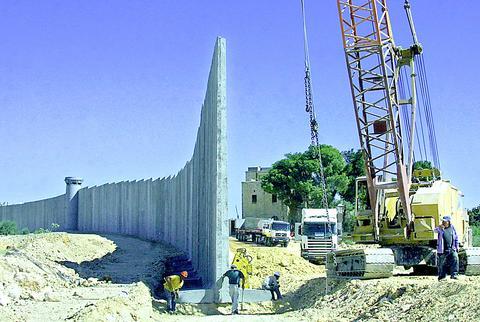Israel's construction of its West Bank barrier went ahead full force yesterday, hours after the UN General Assembly overwhelmingly passed a resolution calling for the structure to be torn down in compliance with a world court ruling.
Palestinian Cabinet minister Saeb Erekat said it was "unfortunate" that Israel was ignoring the nonbinding ruling handed down earlier this month by the International Court of Justice in The Hague, Netherlands, as well as Tuesday's UN resolution.
"I hope that the international community will continue to exert every effort to make Israel comply with the UN resolutions," Erekat said.

PHOTO: AFP
Bulldozers worked yesterday in Abu Dis, a Palestinian suburb of Jerusalem.
Workers raised 8m-high concrete walls that are rapidly separating the Palestinian area from Jerusalem, a city which Abu Dis is highly dependent on for employment and other services.
The 150-6 vote late Tuesday, with 10 abstentions, reflected the widespread international opposition to the 685km barrier, which Israel says is needed to protect its citizens from suicide bombings.
The UN resolution, like the world court's advisory opinion, is not legally binding. Both have symbolic value as international statements of support for the barrier's destruction.
But Israel has over the years defied, ignored and brushed off UN resolutions, including ones calling for it to end its occupation of the West Bank and Gaza Strip.
Israel's Supreme Court -- in a ruling meant to apply to the entire structure -- has found that the barrier violates international law and human rights in areas where it cuts Palestinians off from their lands, schools and other towns.
The ruling has forced the government to reroute nearly the entire portion of the unbuilt barrier. Officials said most of the structure would be moved closer to the so-called Green Line, the unofficial frontier before Israel captured the West Bank and Gaza in the 1967 Mideast war.
Meanwhile, Palestinian President Yasser Arafat yesterday ordered an investigation into the shooting of a key critic of his unrelenting grip on power as Palestinian officials warned of dire consequences for law and order in their territory.
Nabil Amr, a lawmaker seriously wounded by a sniper's bullets, issued a plea for calm and hinted that someone was trying to silence him.
A sniper shot Amr in the West Bank city of Ramallah late Tuesday. An advocate of reforms for years, Amr had increased his criticism of Arafat in recent days as the leader refused to relax his control over security forces.
Also see story:

DAREDEVIL: Honnold said it had always been a dream of his to climb Taipei 101, while a Netflix producer said the skyscraper was ‘a real icon of this country’ US climber Alex Honnold yesterday took on Taiwan’s tallest building, becoming the first person to scale Taipei 101 without a rope, harness or safety net. Hundreds of spectators gathered at the base of the 101-story skyscraper to watch Honnold, 40, embark on his daredevil feat, which was also broadcast live on Netflix. Dressed in a red T-shirt and yellow custom-made climbing shoes, Honnold swiftly moved up the southeast face of the glass and steel building. At one point, he stepped onto a platform midway up to wave down at fans and onlookers who were taking photos. People watching from inside

MAKING WAVES: China’s maritime militia could become a nontraditional threat in war, clogging up shipping lanes to prevent US or Japanese intervention, a report said About 1,900 Chinese ships flying flags of convenience and fishing vessels that participated in China’s military exercises around Taiwan last month and in January last year have been listed for monitoring, Coast Guard Administration (CGA) Deputy Director-General Hsieh Ching-chin (謝慶欽) said yesterday. Following amendments to the Commercial Port Act (商港法) and the Law of Ships (船舶法) last month, the CGA can designate possible berthing areas or deny ports of call for vessels suspected of loitering around areas where undersea cables can be accessed, Oceans Affairs Council Minister Kuan Bi-ling (管碧玲) said. The list of suspected ships, originally 300, had risen to about

A Vietnamese migrant worker yesterday won NT$12 million (US$379,627) on a Lunar New Year scratch card in Kaohsiung as part of Taiwan Lottery Co’s (台灣彩券) “NT$12 Million Grand Fortune” (1200萬大吉利) game. The man was the first top-prize winner of the new game launched on Jan. 6 to mark the Lunar New Year. Three Vietnamese migrant workers visited a Taiwan Lottery shop on Xinyue Street in Kaohsiung’s Gangshan District (崗山), a store representative said. The player bought multiple tickets and, after winning nothing, held the final lottery ticket in one hand and rubbed the store’s statue of the Maitreya Buddha’s belly with the other,

Japan’s strategic alliance with the US would collapse if Tokyo were to turn away from a conflict in Taiwan, Japanese Prime Minister Sanae Takaichi said yesterday, but distanced herself from previous comments that suggested a possible military response in such an event. Takaichi expressed her latest views on a nationally broadcast TV program late on Monday, where an opposition party leader criticized her for igniting tensions with China with the earlier remarks. Ties between Japan and China have sunk to the worst level in years after Takaichi said in November that a hypothetical Chinese attack on Taiwan could bring about a Japanese